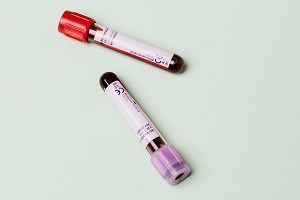Generation of lymphoblastoid cell lines (LCLs) by EBV transformation from separated frozen whole blood, and from PBLs
 Lymphoblastoid cell lines (LCLs) are generated by Epstein-Barr Virus (EBV) transformation of the B-lymphocyte component within the peripheral blood lymphocyte (PBL) population. Once a cell line has been successfully established, a bank of four ampoules is generated and stored in our cryostorage facility.
Lymphoblastoid cell lines (LCLs) are generated by Epstein-Barr Virus (EBV) transformation of the B-lymphocyte component within the peripheral blood lymphocyte (PBL) population. Once a cell line has been successfully established, a bank of four ampoules is generated and stored in our cryostorage facility.
Sample progress is tracked using a purpose built Laboratory Information Management system, linked to electronic inventory management software. As part of routine quality assurance, all cell banks are screened for freedom from mycoplasma, and a proportion of every batch is tested for sterility, cell count and viability and authenticity against source material (blood spot card prepared at receipt) using STR-PCR profiling.
The process takes approximately five to six weeks to complete. As part of the service, frozen cells or a growing culture (if requested at the time of transformation) can be returned to the customer. A start-up fee will be charged for growing cultures requested at a later date.
From PBLs
We have the capacity to initiate up to 1000 scheduled EBV transformations per month, the overwhelming majority of which are from frozen PBLs resuscitated from liquid nitrogen storage, and we aim to achieve a transformation success rate of at least 95% at first attempt.
From frozen whole blood
We have developed a procedure for direct EBV transformation of small amounts (0.8ml) of cryopreserved whole blood without the requirement for prior separation of PBLs. The ability to directly transform frozen whole blood avoids the cost of separating and storing PBLs while retaining the option to make a cell line at any time from all or a subset of the collection.
High transformation success rates consistently over 90% have been achieved using blood that has been cryopreserved for more than 4 years. You can view the data presented at the ISBER bio-banking conference 2011 in Rotterdam by clicking this link: An efficient, cost effective method for the generation of immortalized cell lines from small quantities of cryopreserved whole blood
describing the method we have developed to generate cell lines from whole blood samples was published by Nature Methods.
